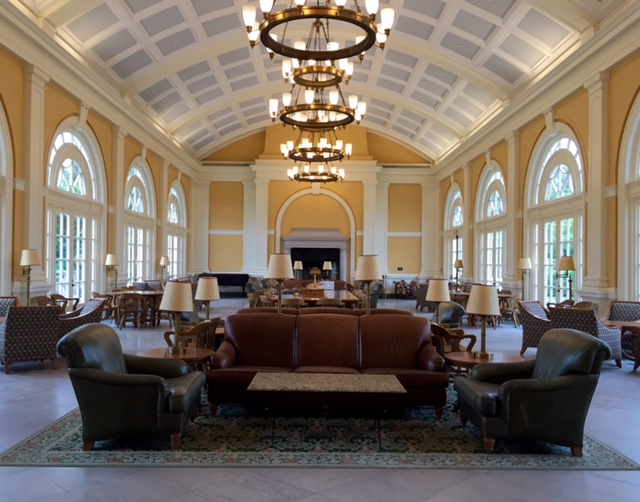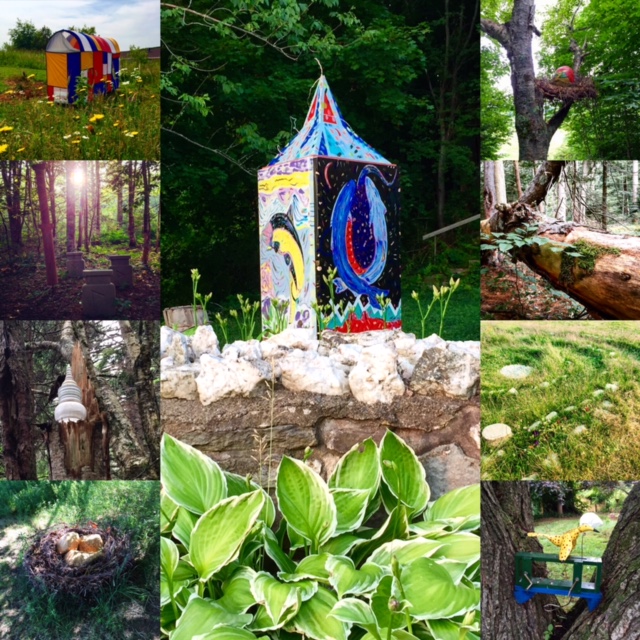It all started with these:
I find them on a table the first day of our house-sit in Wolfville, Nova Scotia, pick one up, and start reading:
"The Uncommon Common Art exhibit locates visual art outside of the institutional context, presenting a public body of work that promotes the discovery and appreciation of the rural natural environment. The exhibit emphasizes finding the unexpected, thought provoking piece of art where you might not expect to. Installations are site specific with the location being a key component to the art piece. The installations are gifts to the observers of nature to find, explore, talk about, and share. Through this project we hope to engage and educate about art, environment, outdoor activity, and our rural community."
The brochure says the founder and curator of UCA is originally from Chicago. I'm from Chicago too. Sort of. Technically I'm from a suburb of Chicago. But that's not what I usually say. The other thing that catches my eye and quickens my pulse is the grid at the back of the pamphlet, with numbers corresponding to each of sixteen art installations. At each site there's supposed to be a stamp in a little metal box so that as you find each one you can fill in the matching box in your booklet. The lure of the grid and the stamps is powerful. The next day we start looking for art.
Stop one is easy to find. It's right there on the side of the road.
 |
| Opportunity Knocked - by Nicole Evans and Patrick Farrell |
And when we drive a little farther down the road we find this.
Evangeline Beach. Which might look a little bit mucky and brown, but that's because the world famous Bay of Fundy tide is going out and exposing the mudflats. And those mudflats are the place where thousands of sandpipers return every year, to eat up all the uncovered mud shrimp they can find, and fatten themselves up for their long migration. A journey that also takes them to Cheyenne Bottoms, Kansas. And Kansas is where we were just a few days ago, visiting some of my people. Because I might say Chicago is the place that I'm from, but Kansas is where I was born.
And when we drive a little farther, we stumble upon the Grand Pre National Historic Site. The site that commemorates the tragic tale of the expulsion of the Acadian people from Nova Scotia during the French and Indian War. And we realize we don't even know who the Acadians were, and here we are walking around in their world. So we go inside, and listen to the passionate eloquent fact-full guide tell us everything she knows about their story. We learn about Longfellow's epic poem, Evangeline, a Tale of Acadie, and how it's a fictionalized version of what happened. And we realize we both must have been absent from school that day, because neither one of us knows anything about any of this.
When we find Migration, we also find the botanical gardens on the campus of Acadia University. And when we peek in the windows of the biology building next door, we find this peaceful elegant room that is open to the public every day. A room with soft couches, and trickling water fountains, and free wi-fi. A place we will come to more than once in the days ahead, with our computers and our books and our ceaseless searching thoughts. And when we wander through the gardens among the indigenous plants, all laid out in sections for the different habitats, we think about our daughter back home in Hawaii, and her love for the native plants there, and her tireless efforts to protect them.
We keep finding art, and stamping the numbers in the back of the UCA booklet.
When we find this one, we also find Miner's Marsh. Which is a place where the good guys are trying to preserve the native marsh eco-system. A place where they're working to save the "water, wetlands, and wildlife for the generations of tomorrow."
 |
Pasture Gate - by Brad Hall |
Some of the pieces try to get us to think, and some make us see ourselves as we might rather not.
And some are just silly in stacks.
 |
| Pyramid Scheme - by Twila Robar-DeCosta |
Some are easy to find, and some are the farthest most opposite of that. As we search we discover farms feeding people, and nature preserves, and houses like outdoor art museums. We get bitten by the most giant mosquitoes ever known to man, and chased by angry and persistent yellow and black flies. We get lost, and then found. Our car falls into giant potholes that almost break it in half. We get irritated with each other, and sometimes we laugh. We ask questions, and try to understand. Or not. We remember how small and connected it all is, and how much there is yet to learn. We remember that sometimes the good guys win. And we think of our daughter, and everyone's daughters, and know hope.
 |
| Frost Path - by Alan Bateman |






No comments:
Post a Comment